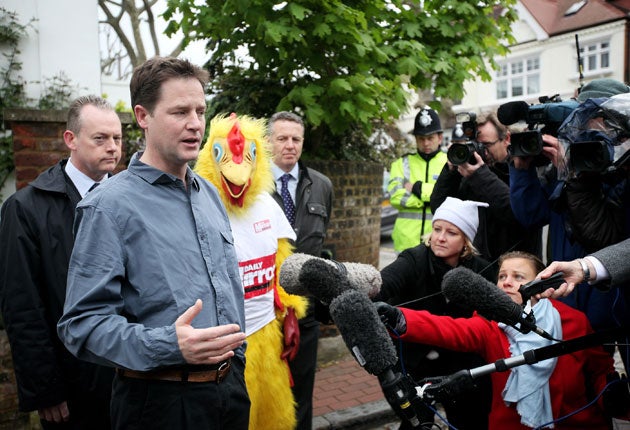No deal without electoral reform, party warns Clegg

Your support helps us to tell the story
From reproductive rights to climate change to Big Tech, The Independent is on the ground when the story is developing. Whether it's investigating the financials of Elon Musk's pro-Trump PAC or producing our latest documentary, 'The A Word', which shines a light on the American women fighting for reproductive rights, we know how important it is to parse out the facts from the messaging.
At such a critical moment in US history, we need reporters on the ground. Your donation allows us to keep sending journalists to speak to both sides of the story.
The Independent is trusted by Americans across the entire political spectrum. And unlike many other quality news outlets, we choose not to lock Americans out of our reporting and analysis with paywalls. We believe quality journalism should be available to everyone, paid for by those who can afford it.
Your support makes all the difference.Nick Clegg will be forced to face the growing concerns within his party over co-operating with a Tory government amid unease that the Liberal Democrats may fail to secure any major concessions on changing Britain's voting system.
The Liberal Democrat leader, who has been warned by senior members of the party not to form a pact with David Cameron without a "significant" offer on electoral reform, will again meet with his MPs and the party's federal executive to discuss the state of the negotiations.
So far, the party's leadership has been delighted with how party unity has held together in the light of the disappointing election result and the frantic talks with the Tories. But activists and members have now begun to speak out against any deal that would see the Liberal Democrats allow Mr Cameron run even a minority government without the "bare minimum" of a referendum on proportional representation.
Mr Clegg was finally able to spend some time with his family yesterday morning as his some of his closest colleagues met with their Tory counterparts at the Cabinet Office. He kept in touch from his Putney home with regular phone calls from his representatives, Chris Huhne, Danny Alexander, David Laws and Andrew Stunell. He was not giving much away as he emerged from his home with his family yesterday morning. "Everyone's trying to be constructive for the good of the country," he said. "I'm very keen that the Liberal Democrats should play a constructive role at a time of great economic uncertainty to provide the good government that this country deserves."
However, he was thrown into the thick of the action by late afternoon, speaking to Mr Cameron over the phone and heading to an hour-long meeting with Gordon Brown in Whitehall. With the deals from the two parties now emerging, his party will hear more of the detail today.
Members of the parliamentary party have begun to push harder in favour of opting for a deal with Labour that would see them immediately accept a referendum on the "alternative vote", a system backed by some as it maintains the link between MPs and constituencies. The previously slim chances of joining a "traffic-light coalition" with a new Labour leader were growing, according to a source familiar with the discussions. "There are no signs that anyone in the negotiations will compromise on electoral reform," the source said. "We want an absolute promise from either side. This is our moment. If we don't take it, we may not get another for 50 years."
Lembit Opik, the former Liberal Democrat MP, said the party simply "would not wear" any deal with Mr Cameron without a serious concession. "My advice to the party leadership would now be, 'Forget the popularity in the polls, this is about something far more important'," he told The Independent. Simon Hughes, the party's climate change spokesman, said he and his colleagues remained "very suspicious" of the Tories' ability to offer an acceptable deal on electoral reform, warning "irreconcilable differences" still existed between the parties. "The party would have to move significantly if they were to deliver this because they have sounded superficially accommodating, but fundamentally pretty unreconstructed. The further you go away from the leadership, the more unreconstructed they are," he told the BBC.
Mr Clegg has to convince MPs, peers and senior party members to accept any deal as part of the Liberal Democrats' "triple lock" system. Party members believe that, while there were initial fears the process would slow down any agreement, in reality it has given Mr Clegg a slightly stronger hand at the negotiating table. "It is proof to the other parties that something has to be agreed that will be acceptable to the whole party," said Martin Tod, a former member of the Liberal Democrats' federal executive. "Though it may have frustrated many, in effect it has helped us." The Liberal Democrats' president, Baroness Scott, wrote to party members yesterday to reassure them that the position set out by Mr Clegg had been "fully endorsed".
In public, current Liberal Democrat MPs were giving Mr Clegg leeway last night, arguing that securing changes to the voting system was far from the only issue at stake.
Join our commenting forum
Join thought-provoking conversations, follow other Independent readers and see their replies
Comments